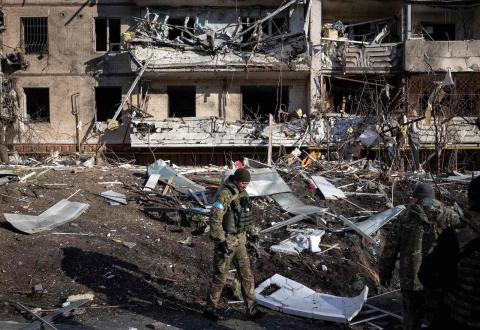“Crush treason ruthlessly, crush it mercilessly.”
Modest Mussorgsky, Boris Godunov (1874), Act IV, Scene 2
In theory, Russia prohibits capital punishment – even mass murderers are jailed for life. But in practice, some Russians accused of treason or seen as a threat to the state, or to its present custodians, are condemned to death.
Suspicions around an apparent nerve-agent attack on a former Russian spy in Britain are born of bitter experience.
In his memoir, former KGB general Oleg Kalugin relates that the assassination of defectors, and some dissidents, was the established policy of the KGB – the predecessor of the current Russian Federal Security Service (FSB) – and that he knew of eight instances of its implementation. Kalugin also tells of how, in the early 1970s when he was head of its First Directorate, responsible for counter-intelligence, the KGB tracked down a defector in Australia and proposed his execution.
This defector was almost certainly Vladimir Petrov. Kalugin writes that then KGB head Yuri Andropov ordered him to focus on taking-out more recent defectors. One can only speculate on the consequences for Australia’s relations with Russia had Andropov given his assent.
The policy of assassinating those abroad deemed traitors goes back to the Cheka, the secret police set up by Vladimir Lenin in 1917, succeeded by the KGB and today’s FSB. Throughout the 1920s and 1930s, Cheka agents carried out hundreds of assassinations, especially in Western Europe. Leon Trotsky was perhaps the Cheka’s most famous victim, but by the 1950s the ice pick with which he been killed had given way to methods designed to conceal traces.
The use of sophisticated poisons by Russian assassins has a considerable history in which the Alexander Litvinenko case is but a recent example. In 1961 a KGB defector, Bohdan Stashinsky, gave details of a miniature pistol firing cyanide that he had used to kill two Ukrainian nationalists living in western Europe.
Following so soon after Vladimir Putin’s truculent and bellicose arms-bazaar address to a rapturous audience in Moscow, yet another assassination would again underline that for the first time in its history, Russia is ruled by an espionage officer supported by a cabal with the collective outlook and values of the Russian secret police.
In Putin’s case, this mentality is coloured by what a well-informed Russian journalist described as a quest to revenge the humiliation of the Soviet Union’s defeat in Afghanistan and its subsequent collapse. This attitude is captured by the Russia word obida, which has no equivalent in English. Obida connotes an unforgivable insult and the smouldering resentment that it fuels.
The tribal notion of the Russian state to which Putin and the FSB/GRU (Main Intelligence Directorate) cleave makes Russia the supreme moral value, above God, or at least identified with the deity. Under this sacralisation of the state, the Russian people serve the Motherland, and not the other way around.
To traduce the state is tantamount to heresy – the most heinous of crimes. Putin has shown that he is a determined and vengeful repository of this tradition: in 2010 he assured a TV audience that all traitors would die; and he once vowed publicly to hang the president of Georgia by his testicles.
Similarly, according to this outlook, service in the FSB, the “sword and shield of the state”, is the highest, most noble vocation. Putin’s biographers make much of the fact that this was his vocation as a young man. As former deputy-head of Putin’s Secretariat Vyacheslav Volodin said, “without Putin there is no Russia” (in recent years, Putin’s cult of personality has become even more Orwellian).
Treason, therefore, is not only the worst of crimes but also obida – to the state and to Putin himself, the personification of the state, a man chosen in 2017 as the “second greatest figure in history” (after Stalin) by a clear majority of 1600 Russians in a reputable opinion poll.
If, as now seems likely, former Russian spy Sergei Skripal and his daughter Yulia prove to be the latest victims of the tradition of hunting down those accused of treason, the brazen nature of the assassination was presumably designed to demonstrate Putin’s unhindered reach and resolve to protect the state by crushing treason. Our bungling enemies, the patrons to whom you have betrayed the Motherland, can never protect you.
Putin has repeatedly asserted Russia’s right to protect not only its citizens but also any inhabitants of other countries who consider themselves to be part of what he calls Russkiy Mir (the Russian World); that is, the global Russian diaspora, and others who identify with Russia and support his policies. By ordering or authorising the murder of defectors such as Litvinenko and Skripal, Putin is also asserting the right to take the lives of Russians wherever they may be. He has revived the practices of the Cheka and the Cold War KGB. (Given the concentration of power in Putin’s hands, the nod for such acts, with their potential consequences for Russia, almost certainly come from him.)
In the past, targets of assassination have included non-Russians. Russo-British relations have a fraught, centuries-long history, including the Crimean War and numerous incidents in the silent war of the intelligence services. Many Russians and escapees from the Soviet-Russian empire have chosen the UK as their place of asylum; some have been pursued there, and some more live in fear.
In Putin’s time, the UK has repeatedly granted asylum to figures he sees as sworn enemies, including a number that have died in unexplained circumstances. Over recent years, Kremlin commentators have taken to referring to “Anglo-Saxons” as Russia’s particular enemy. The propaganda on television stations Russia 1 and NTV, bellicose enough when I last saw it, has acquired a fervid and paranoid tone exemplified the outburst on Russia 1 by retired colonel Igor Korotchenko, “The Anglo-Saxons are a breed that understands only one thing – force!”
Commentators have noted that the Kremlin has reason to bear a special grudge against Christopher Steele, the former MI6 officer who wrote the dossier on ties between Donald Trump and the Kremlin that lead to the Mueller inquiry. Steele may now have reason to feel uneasy.

